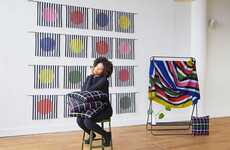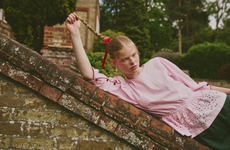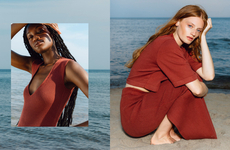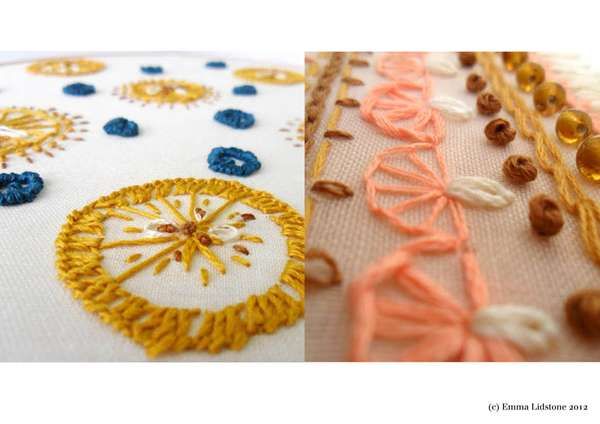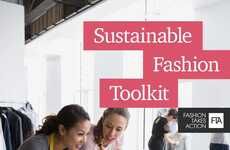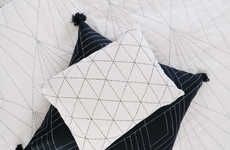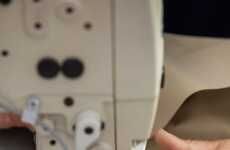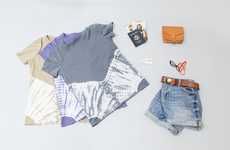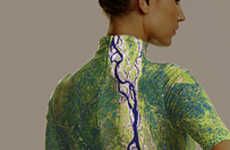
Sustainable and Ethical Design and Manufacturing
Jenn Viane — April 11, 2012 — Social Good
References: facebook & thethreadproject.blogspot
Akin to the way a piece of fabric is woven together, The THREAD Project is about making connections between textile and fashion designers, producers and manufacturers around the world.
A non-profit organization, The THREAD Project works with up and coming fashion and textile designers in the UK to help them connect with, understand and create positive, sustainable and ethical partnerships with manufacturers around the world.
In an interview with Josie Warden, she sheds light on The THREAD Project, the brainchild of she and friend Isolde Jaspard Mandy.
Five Questions with Josie Warden
1. How did you get involved in the Thread Project?
It started out around the time of our dissertations in the final year of our studies at University College Falmouth. Both Isolde and I wanted to explore the textile industry particularly in relation to issues of sustainability and production. During a presentation by one of our Tutors who had been to Bangladesh as part of a research exchange, we looked at each other and said, “This is it!”
We spent the rest of the evening brain storming and The THREAD Project was born! Initially we planned for it to be a research trip to India to visit factories and producers of textile good but we realized we wanted to share what we were seeing and create something others could get involved with.
While the textile industry is at the heart of our interests as designers, we realized the realities of what happens in these factories and the impact it makes was so far away from us. It was an invaluable experience and is leading us to other exciting things.
2. What's the vision for the Thread Project in 5 years?
We hope to continue our research and develop more resources to support and inspire students and emerging designers to learn more about sustainability issues and consider them in their own work.
We've been running Sandur x Falmouth, a project with second year mixed media students at University College Falmouth. The project brief was developed around a hand embroidery organization Isolde and I met in India -- Kushala Kala Kendra -- where the students use traditional stitch techniques as a starting point for their work.
When we met the embroiderers at Kendra, we were immediately struck by the similarities between the way the women worked in their centers and the way we worked in our studios, yet so many other aspects of life were completely different. We wanted to get both groups interacting through design and stitch in this project and we are hoping to continue and expand it in the future, and hopefully get involved in more projects along these lines.
3. Where do you find the greatest source of inspiration?
I'm a big advocate of travel, be it in another continent or just a new part of the city you live in -- a regular change of perspective does wonders for the imagination, and the soul! I find that being taken out of my comfort zone opens my eyes a bit and makes me much more receptive to new ideas or visual inspiration. It's so easy with the Internet to access a huge variety of ideas and images but nothing beats getting out and finding things for yourself.
4. Share a success story that resulted in the good work you do.
We've been really pleased by the positive response to the early days of The THREAD Project. The best thing has been connecting people with information they need or really interested in and seeing them go on to do something exciting with it. We’ve connected students incorporating sustainable and ethical practice into their work, to people visiting and working, with contacts we’ve made. That's the idea of The THREAD Project -- there is so much information out there and companies doing exciting things, but sometimes it's hard to find it; we want to help make those connections easier and bring sustainability to the forefront of designers minds.
5. Fill in the blank: Life is too short…
...not to visit India -- it will change your life!
Josie Warden and Isolde Jaspard Mandy are textile designers in the UK. You can find Josie's work at Josie Warden.
Images courtesy of Josie Warden and Isolde Jaspard Mandy
A non-profit organization, The THREAD Project works with up and coming fashion and textile designers in the UK to help them connect with, understand and create positive, sustainable and ethical partnerships with manufacturers around the world.
In an interview with Josie Warden, she sheds light on The THREAD Project, the brainchild of she and friend Isolde Jaspard Mandy.
Five Questions with Josie Warden
1. How did you get involved in the Thread Project?
It started out around the time of our dissertations in the final year of our studies at University College Falmouth. Both Isolde and I wanted to explore the textile industry particularly in relation to issues of sustainability and production. During a presentation by one of our Tutors who had been to Bangladesh as part of a research exchange, we looked at each other and said, “This is it!”
We spent the rest of the evening brain storming and The THREAD Project was born! Initially we planned for it to be a research trip to India to visit factories and producers of textile good but we realized we wanted to share what we were seeing and create something others could get involved with.
While the textile industry is at the heart of our interests as designers, we realized the realities of what happens in these factories and the impact it makes was so far away from us. It was an invaluable experience and is leading us to other exciting things.
2. What's the vision for the Thread Project in 5 years?
We hope to continue our research and develop more resources to support and inspire students and emerging designers to learn more about sustainability issues and consider them in their own work.
We've been running Sandur x Falmouth, a project with second year mixed media students at University College Falmouth. The project brief was developed around a hand embroidery organization Isolde and I met in India -- Kushala Kala Kendra -- where the students use traditional stitch techniques as a starting point for their work.
When we met the embroiderers at Kendra, we were immediately struck by the similarities between the way the women worked in their centers and the way we worked in our studios, yet so many other aspects of life were completely different. We wanted to get both groups interacting through design and stitch in this project and we are hoping to continue and expand it in the future, and hopefully get involved in more projects along these lines.
3. Where do you find the greatest source of inspiration?
I'm a big advocate of travel, be it in another continent or just a new part of the city you live in -- a regular change of perspective does wonders for the imagination, and the soul! I find that being taken out of my comfort zone opens my eyes a bit and makes me much more receptive to new ideas or visual inspiration. It's so easy with the Internet to access a huge variety of ideas and images but nothing beats getting out and finding things for yourself.
4. Share a success story that resulted in the good work you do.
We've been really pleased by the positive response to the early days of The THREAD Project. The best thing has been connecting people with information they need or really interested in and seeing them go on to do something exciting with it. We’ve connected students incorporating sustainable and ethical practice into their work, to people visiting and working, with contacts we’ve made. That's the idea of The THREAD Project -- there is so much information out there and companies doing exciting things, but sometimes it's hard to find it; we want to help make those connections easier and bring sustainability to the forefront of designers minds.
5. Fill in the blank: Life is too short…
...not to visit India -- it will change your life!
Josie Warden and Isolde Jaspard Mandy are textile designers in the UK. You can find Josie's work at Josie Warden.
Images courtesy of Josie Warden and Isolde Jaspard Mandy
Trend Themes
1. Sustainable Fashion - The rise of sustainable and ethical fashion partnerships presents an opportunity for textile designers to connect with positive manufacturing practices and expand their eco-friendly offerings.
2. International Manufacturing Collaboration - The THREAD Project's commitment to partnering UK designers with international sustainable manufacturers highlights an opportunity for cross-border eco-friendly production collaboration.
3. Education on Sustainability - The THREAD Project's aim to educate designers on sustainability issues creates an opportunity for similar educational initiatives that promote ethical fashion practices.
Industry Implications
1. Textile and Fashion Design - Sustainable and ethical fashion practices and partnerships are disrupting textile and fashion design, creating opportunities for those prioritizing eco-friendly production and manufacturing.
2. International Manufacturing - The growth of sustainable international partnerships calls for increased cross-border manufacturing collaboration and eco-friendly production practices.
3. Sustainability Education - The popularity of sustainable fashion highlights a need for sustainability education initiatives that promote ethical production and design practices in the fashion and textile industries.
4.4
Score
Popularity
Activity
Freshness


